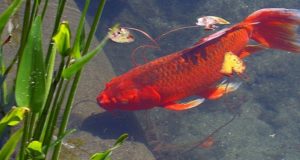Please welcome back Patty Little for another excellent pond blog.
Surprisingly enough, “If You Build it They Will Come,” does not only apply to ghost baseball players in a former cornfield. I think a lot of people are astounded at the plants and animals that appear and establish in their back yard when they build small ornamental ponds.  By creating a water feature, you invite all kinds of things from wild areas, and you may find the addition of this little oasis is more of a reward than you could have imagined. The more you are able to observe your pond, the more you are likely to see these visitors, or at least signs that they are visiting.
By creating a water feature, you invite all kinds of things from wild areas, and you may find the addition of this little oasis is more of a reward than you could have imagined. The more you are able to observe your pond, the more you are likely to see these visitors, or at least signs that they are visiting.
Whether you live in a rural, suburban or urban environment, the presence of fresh, cool, flowing water becomes an instant attraction for living things from land and air, both wanted and unwanted. I thought it might be fun to mention a few of the things you may encounter once your water feature is established.
The first thing we do to our ponds is beautify them with plants both in and around, then add some fish- koi, comets, orfes, whatever suits our fancy! Soon after, the magic begins. Think of all of those unseen eyes and keen senses suddenly aware of the newest neighborhood water resort.
You may see lots of interesting things appear beneath the surface. There are lots of insects whose larvae exist first in water, later to morph into airborne adults. These include some beetles, flies, and of course the lovely dragonflies and damselflies. Don’t rush to rid your pond of these alien-looking guys if you come across them, they will serve as a food source for more interesting visitors, and should not be harmful to large fish.
Frogs, toads, and newts may be some of the first outsiders to take residence. They love the water and the damp areas surrounding the pond, and the abundance of insects that will also be attracted to the water. These are for the most part desirable to have in the pond both for aesthetics and for insect control. In the spring, you may notice clusters of eggs and tadpoles. Most of the amphibians that survive to adulthood will probably move on when they are able, so don’t worry too much about being plagued by frogs.
Reptiles need water too, so under the right conditions it is possible that snakes and turtles native to your area may be found in and around a pond. These may come and go, and the best policy would be to leave them alone, like any other wild animal. They do not intend you or your pond any harm, and in the unlikely event that you may encounter a reptile that does warrant outside attention, contact someone at your local fish and wildlife organization before taking matters into your own hands.
Songbirds are not the only feathered visitors you’ll see. Count on water birds like ducks to stop off for a swim, and herons, egrets, and kingfishers to name a few that might stop off for a snack, particularly with fish and frogs as food offerings. The best you can do is to look for methods to deter these predators from your pond if you find them troublesome, but do not cause them any harm.

Depending on your location, anything from opossum and raccoon, to deer and bear may be curious enough to visit your pond. You may never see any sign of these visitors as many are active at night, but under duress of climactic issues (like severe drought for example) or habitat infringement, animal encounters are seemingly more and more frequent. If you should witness their visits, it is best to quietly observe and leave the animal to its own. Anyone visiting the blog from more temperate areas than Pennsylvania may have other interesting tales of visitors as well. I’ve seen footage of Florida residents with visiting alligators and even constrictors (released or lost by irresponsible keeper, now established breeding populations) in small backyard ponds…that would be a shock to see here!
Other things you may find are snails that may hitchhike in potted plants or establish from eggs on plants. Plants, particularly small floaters like duckweed may appear in your pond too. Remember that birds and animals that visit your pond have probably visited lots of other watery areas and may carry with them welcome, or unwanted, introductions to your pond. If you build it, chances are they will come, good and bad, curious and hungry, but all unique and beautiful in their own right. Welcome to the world of ornamental pond ownership!
Until Next Time, Patty
 That Fish Blog – Aquarium Advice and Information
That Fish Blog – Aquarium Advice and Information


Was that a weasel in my pond? It looked like a giant chocolate-brown ferret and dove and swam like an otter.
Probably a mink if they are found in your area, they are darker in color and more prone to be found near around aquatic environments.
Thank you. Now I’m sure it was a mink.